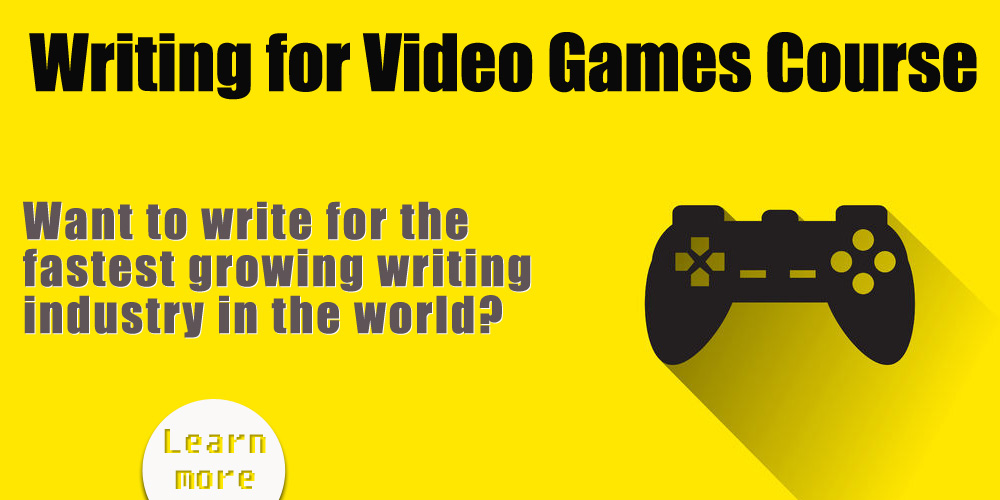How do you write a script for a video game? And how does writing for games differ from conventional story-telling? Game narration writer PAUL DUNN answers these key questions.
Telling a great story isn’t that hard. Once upon a time there was a beginning. Suddenly something went wrong. It took great effort and heroic struggle to overcome it, and at least one person lived happily ever after.
But games don’t work in a linear, predictable way.
What if your hero doesn’t want to slay the dragon? What if your merry band of explorers decide to raze the village, rather than rest in it? What if they run right into the battle without hearing the ballad of the dethroned king? Or slay the alien champion before you’ve told them how significant this confrontation is?
These are the types of challenging questions facing every game writer.
Why is writing for video games different to other kinds of story writing?
When writing for a video game, player agency—the freedom a player has to make choices and act according to their own agenda—is the wildcard that a narrative designer needs to keep in mind.
Chances are high that a player will miss a significant speech as they rush around pillaging the monster’s lair, or skip right over your carefully crafted text. They may never stop to talk to the cop at the front desk, or read the display on the starship’s main console.
So how are you expected to get the story told?
Like any author, a game writer needs a diverse and well-stocked toolkit, but they also need a keen understanding that the protagonist will have the last word in what they do or don’t engage with.
A game writer doesn’t have the luxury of a single, linear narrative. Instead, they must create a jigsaw of elements that can be pieced together into a cohesive picture, even if some of them are never found.
This means that dialogue, while helpful, can’t carry a game story any more than it can carry a novel. Telling everything is boring, and in a game there’s no guarantee that the player will even talk to your carefully created character!
The same goes for rich tomes full of lore. Sure, they are handy to have, but you can’t expect the average player to wade through fifteen pages of text when there are aliens to shoot or criminals to track.
The player’s freedom to explore can work in the writer’s favour though.
Flavour texts on items and objects give you a plethora of opportunities to hint at deeper meanings and wider worlds.
Who was the creator of that gadget, and why did they leave that note on it? When did the magical sword get lost, and why has it come to light now? Each question prods the player to assemble more of the story themselves and widens their sense of the world they have entered.
More tools in the game writer’s toolbox
Even the visuals play a part in expanding the player’s sense of what is going on and what part they have to play. There’s no guarantee, perhaps, that the hero will walk down this corridor, but the general claustrophobic confines of the spaceship (or vast emptiness of the desert) still say something about the setting and what transpires within it. Audio cues, music and lighting all
contribute to atmosphere, giving the few words the player might encounter a rich context to take root in.
Writing for a video game is a balancing act, forever juggling a sense of story with opportunities for our heroes to go their own way. By scattering pieces of narrative like a jigsaw to be collected and assembled, the game writer can still tell a great story and let players discover it on their own
terms.

About the Author
Paul Dunn is passionate about games and the stories they tell. From those early days when he would sit watching his Commodore 64 load Elite from a cassette tape, he was hooked on the way gaming could open up entire worlds and spin fantastic stories that he could participate in. While the hardware has changed, his love of these immersive and interactive stories hasn’t waned.
Paul came into the gaming industry from a communications background. Working previously with a not-for-profit organisation, his writing invited Kiwis to see the wider world through fresh eyes. Whether it was crafting articles about those making a difference off-shore or sketching impromptu scripts while on the ground somewhere in South Asia, he was driven by the power of stories and the way they draw us in.
Paul has a BA in Media Studies from Massey University and is currently a Narrative Designer for Scarlet City Studios in Auckland, New Zealand. He tutors the Writing for Video Games Course at NZ Writers College, UK Writers College and SA Writers College.
Feedback from graduate students of the Writing for Video Games Course
“The course was very informative – fascinating even – and I felt as though a lot of uncertainties in my writing finally made sense. My appreciation for games and even other mediums of storytelling has increased as well, making them far more enjoyable. I can, with confidence, say that this course was excellent and I recommend it to anyone interested in the industry! Paul was superb throughout! His feedback and guidance on the assignments and the various game elements and narratives
“Great course for people who want to get into the field, or those who already are but could use a little structure. Paul was excellent: patient in answering questions, great at explaining things and very responsive.” Rosemary Lokhorst, Writing for Video Games Course
“I was very fortunate and happy to be able to complete this course. I’ve learnt so much about the industry and most of all I’ve learnt how to improve my future writing projects. Paul Dunn was an excellent tutor and a great help for all the questions I had regarding the course content, no matter how simple and irrelevant I deemed my questions to be. He always promptly responded to my questions and gave me advice and pointers on how to improve my future work. A wonderful college to improve and shape your writing skills.” Stephanie Toerien, Writing for Video Games Course
“The course has been both informative and enjoyable, and provided modules that were not only rewarding to complete but also entertaining to work on. Paul has been an excellent tutor during the course and has been both punctual in his replies and helpful with his advice. He was also a great help in suggesting how to branch into the gaming community after the course was completed. The course has been a fun learning experience and has helped further my knowledge in the specified genre of writing. The Writers College was exactly what I’d been looking for. It has helped better my understanding of this genre of writing, and has helped solidify my thoughts on working towards a career in creative writing.” Rachel Colligan, Writing for Video Games Course
“This course was definitely worth the time; it showed me the big picture of becoming a story writer. I’m really glad I decided to choose NZ Writers College to enrich my inner creativity. My overall experience was remarkable and gratifying.“ Cody Readinger, Writing for Video Games
“I received thorough and practical experience for writing for Video Games. My tutor was very positive and always happy to help; the feedback and critique was really useful. Enjoyable, guided creativity with subject experts rarely found in NZ available for meaningful instruction.” Mathew Anderson, Writing for Video Games Course















